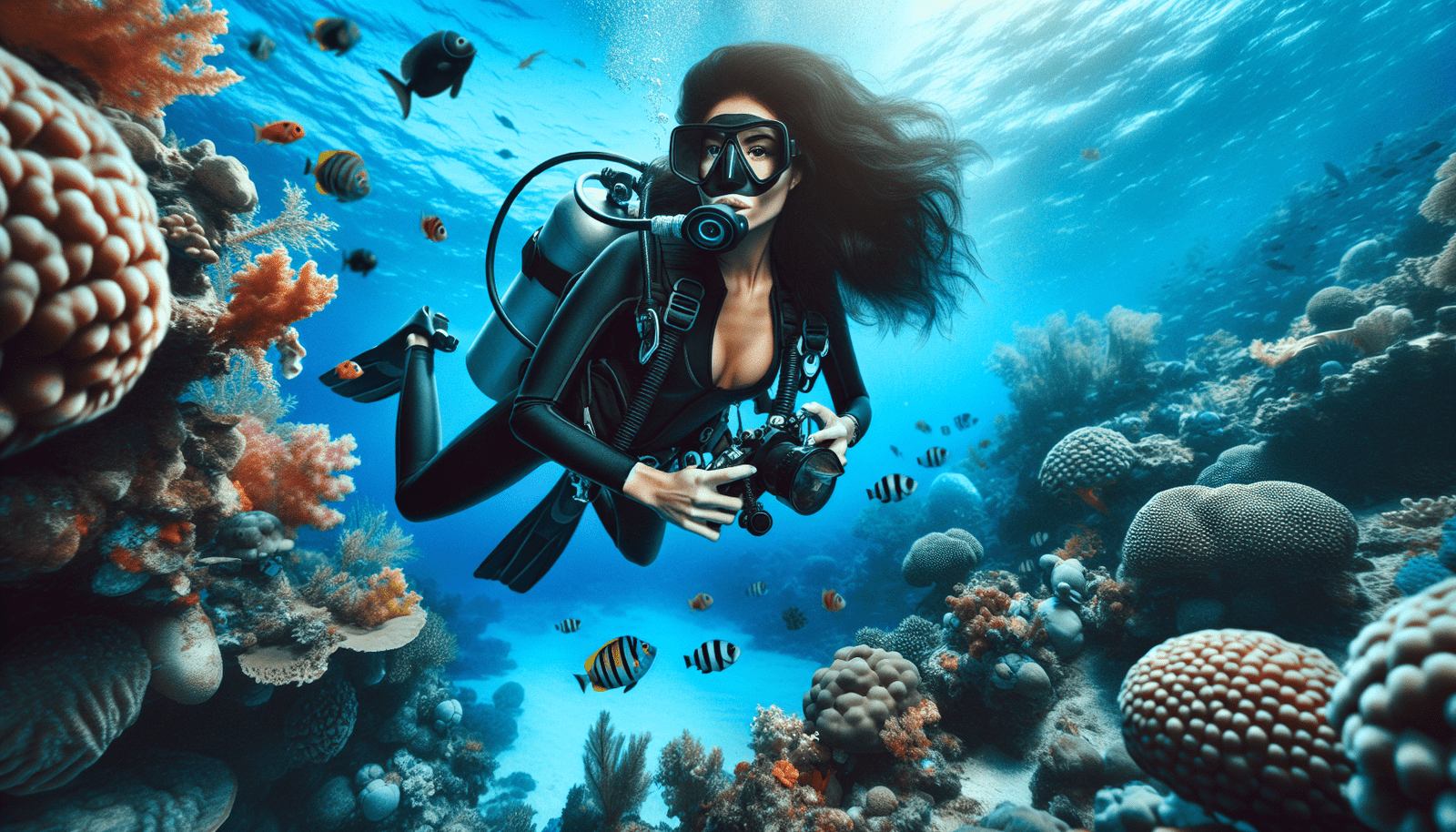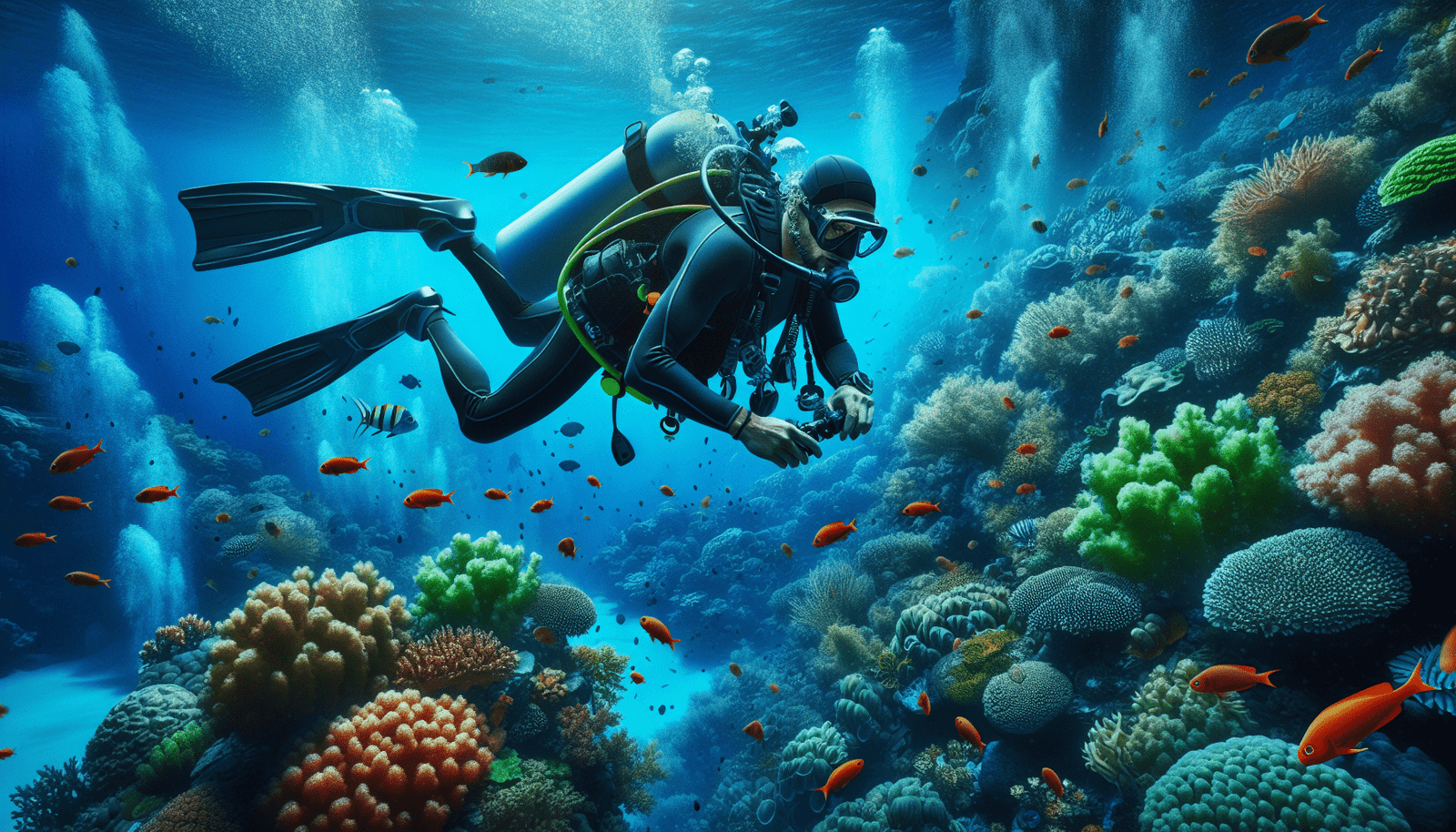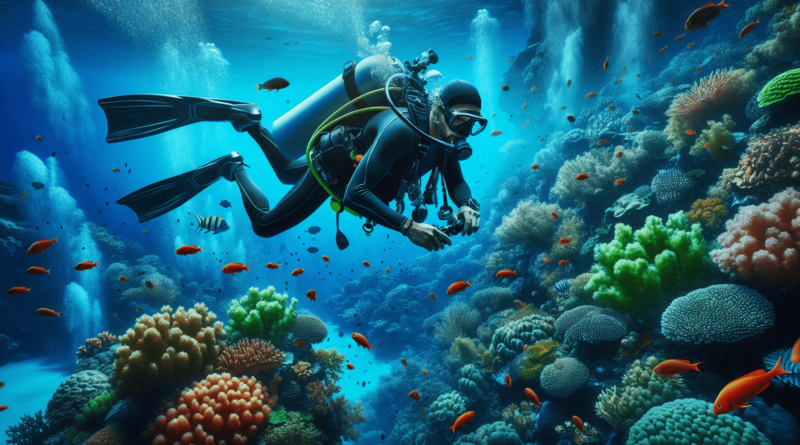Scuba Diving Trips
Get ready to immerse yourself in the world of underwater exploration with “Scuba Diving Trips.” This article will whisk you away on a journey beneath the waves, offering a peek into what makes these underwater excursions an adventure of a lifetime. Whether it’s the exhilarating rush of communing with diverse marine life or discovering hidden treasures in a sunken ship, you’ll learn all about the thrilling experiences that await every scuba diving enthusiast. So strap on your fins, adjust your mask, and get ready to plunge into this one-of-a-kind experience under the sea.

Planning your Scuba Diving Trip
Embarking on a scuba diving trip is an experience of a lifetime! It’s an opportunity to explore the vast underwater world that’s teeming with life and color. Let’s jump into the steps you need to take while planning your trip.
Importance of Proper Planning
Proper planning for a scuba diving trip is essential to make your adventure both enjoyable and successful. It involves not only choosing a destination and budgeting for your trip, but also ensuring that you have the proper equipment, training, and safety measures in place. Your plan should encompass all aspects of the trip including travel, accommodation, dive sites, equipment, and necessary certifications.
Choosing a Destination
Choosing a destination for your scuba diving trip depends largely on your personal preferences and your diving experience. Do you prefer warm, tropical waters or the cooler temperate seas? Are you interested in coral reefs, shipwrecks, cave diving or something else entirely? Research various locations and consider factors such as marine life, visibility, water temperature, and local dive operators.
Budgeting for your Trip
Like any vacation, a scuba diving trip can be as economical or as extravagant as you want it to be. Budget for things like travel, accommodation, meals, diving certification (if needed), equipment rental or purchase, and any additional activities you plan to do. Don’t forget to factor in any insurance costs and possible emergency expenses.
Basic Scuba Diving Equipment Required
Before you pack your bags, let’s go through the basic equipment that is vital for your underwater journey.
Scuba Suit
A suitable scuba suit, such as a wetsuit or a drysuit, is necessary to protect your body from the surrounding water temperatures and potential injuries. The type of suit you choose depends on the water temperature of your chosen destination.
Diving Mask
A clear and comfortable diving mask is crucial to enjoying your underwater adventure. It provides a clear vision and protection for your eyes, enabling you to observe the breathtaking underwater sights comfortably.
Scuba Tanks
Scuba tanks store the air that allows you to breathe underwater. The capacity and type of tank you need would vary depending on factors like the depth of your dive and your air consumption rate.
Diving Regulators
Diving regulators reduce the high-pressure air in your scuba tank to a breathable pressure. You breathe from the regulator’s mouthpiece, and the system delivers air only when you inhale, making it an efficient equipment to support underwater breathing.
Go Pro: Advanced Scuba Diving Equipment
Looking to take your scuba diving adventure up a notch? Consider investing in some advanced equipment.
Dive Computers
dive computers are sophisticated devices that provide you with real-time information about your dive. They calculate your depth, time, and safe ascent rate among other things. They are instrumental in helping divers maintain safety limits and prevent decompression sickness.
Underwater Scooters
Underwater scooters, or diver propulsion vehicles (DPVs), can give your underwater exploration a speed boost. These devices help you cover larger areas without exhausting yourself, making dives more relaxed and enjoyable.
Underwater Cameras
To capture your unforgettable underwater moments, you’ll need an underwater camera. These are specifically designed to withstand the pressure and conditions of the underwater world, and bring home the vibrant colors and scenes of your dive.

Health and Safety Measures in Scuba Diving
Scuba diving is exhilarating, but it’s essential to keep health and safety at the forefront of your experience.
Physical and Medical Requirements
Before starting your scuba adventure, ensure you’re physically fit and healthy. Individuals with certain medical conditions may not be recommended to do scuba diving. A health check-up before diving is a good idea to avoid possible complications.
Safety Guidelines
Scuba diving does involve risks. It’s crucial to understand and adhere to safety guidelines, such as decompression limits, buddy diving practices, use of diving signals, and precautions to prevent marine life disruptions or injuries.
Dive Insurance
Having dive insurance can provide coverage for possible situations such as diving accidents, emergency evacuations, or equipment loss or damage. It’s a vital part of your diving planning that can give you peace of mind while enjoying your underwater exploration.
Learning to Scuba Dive: Courses and Certifications
Before you can dive into the deep blue sea, you need some training. Here are the various courses and certifications you should consider.
Introduction to Scuba Diving Course
An introduction to scuba diving course is an excellent start for beginners. It gives you a chance to learn basic diving theory, get comfortable with the equipment, and take a few shallow dives under professional supervision.
Open Water Diver Certification
The Open Water Diver certification is the first comprehensive training certification for recreational scuba diving. This globally recognized certification is your ticket to dive anywhere in the world.
Advanced Diver Course
Once you have mastered the basics and want to explore more challenging dive environments, you can opt for an advanced diver course. These focus on specific skills like deep diving, navigation, photography, and night diving.
Popular Scuba Diving Locations around the World
Ready to go globe-trotting? We’ve rounded up some of the most-loved scuba diving spots in the world for you.
Great Barrier Reef
Located off the coast of Australia, the Great Barrier Reef is the world’s largest coral reef system. It boasts stunning underwater biodiversity, making it a top destination for scuba divers.
Belize Blue Hole
The Great Blue Hole in Belize is a giant underwater sinkhole. It is known for its deep-blue color and diverse marine life. Advanced divers find it particularly appealing due to its depth.
Galapagos Islands
The Galapagos Islands in Ecuador offer a unique diving experience. Thanks to their isolation, these islands are home to numerous species that cannot be found anywhere else in the world.
Responsible Diving: Conservation and Sustainable Practices
As underwater explorers, it is our duty to protect and preserve the marine environment.
Marine Conservation
One aspect of responsible diving is being an active part of marine conservation. This includes not touching or disturbing marine life, not leaving any trash behind, and taking part in local conservation initiatives.
Respect for Local Cultures and Ecosystems
When diving in foreign lands, respect the local culture, traditions, and rules related to diving areas and marine life. Not only does this enhance your diplomatic relationship with local communities, but it can also contribute to the preservation of the ecosystems in these regions.
Ethical Interaction with Marine Life
A basic principle of scuba diving is to observe marine life, not disturb it. This includes not touching, feeding, or chasing marine creatures. Your underwater behavior can significantly impact local wildlife and ecosystems.
Diving with a Purpose: Citizen Science Programs and Research Dives
Scuba diving doesn’t have to just be about fun. It can also be a way to contribute valuable data to scientific research.
Marine Research Dives
Marine research dives are fundamental in studying underwater ecosystems. As a scuba diver, you can participate in these dives to help researchers collect data about marine organisms and their habitats.
Citizen Science Programs
Citizen science programs enable ordinary individuals to contribute to scientific research. Many such programs focus on marine environments and are always on the hunt for scuba divers to assist in data collection.
Skill Development for Research Diving
If you’re enthusiastic about research diving, consider enhancing your skills by undergoing additional training in specialized areas. This might include species identification, underwater tagging methods, or advanced navigation.
Scuba Diving for Adventure and Exploration
For those of you fueled by adrenaline and the love for unparalleled experiences, let’s dive into some extreme scuba diving adventures.
Cave Diving
Cave diving can be a thrilling experience. As you explore the subterranean water world, it’s not just about the adrenaline rush but also about witnessing some of the most unique environments on the planet.
Wreck Diving
Delving into the mysteries of sunken vessels, wreck diving offers a unique blend of diving, history, and archaeology. From sunken warships to ships claimed by storms, each wreck tells a story waiting to be discovered.
Ice Diving
For those who love to push their boundaries, ice diving presents a unique challenge. Diving under a solid ceiling of ice, you’ll see extraordinary icicle formations and light phenomena that are found nowhere else.
Tips for First-time Divers
New to scuba diving? Here are a few handy tips to help you along.
Respecting your Comfort Zone
As a beginner, you should never push yourself beyond your comfort level. The key to a successful dive is to stay relaxed and enjoy the experience.
Choosing a Good Dive Instructor
A qualified and experienced instructor is essential for learning the right skills and diving safely. Choose an instructor who is patient, communicative, and has a solid background of teaching and diving.
Buddy System in Diving
Always dive with a buddy. Having someone by your side allows for mutual help in case of any difficulties. It’s a basic safety rule in scuba diving and, besides, diving adventures are always more fun when shared!
Whether you’re looking for an adrenaline rush, an exploration into exotic underwater worlds, or a quiet swim amongst vibrant marine life, scuba diving is a thrilling adventure you’ll never forget. Make sure you’re well-equipped, knowledgeable, and respectful of the marine environment. The underwater world is waiting for you! So plan your trip, dive safely, and enjoy every moment spent beneath the surface.




